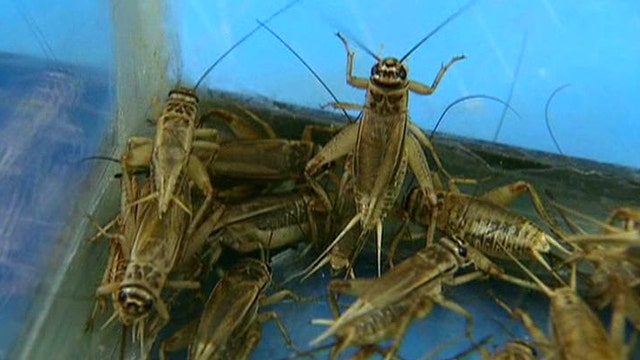It's okay to eat bugs
A Salt Lake City businessman is on a mission to get Americans to eat insects.
A Salt Lake City businessman is on a mission to get Americans to eat insects.
Since 2012, Pat Crowley and his business partner Dan O'Neill, have been making high-protein energy bars made from ground up crickets.
Crowley says eating insects are environmentally friendly and nutritious and believes his Chapul bar (chapul is the Aztec word for cricket) will help get Americans into eating bugs the way California rolls eased many of us into trying sushi.
But for many, eating bugs is a hard sell. That's why Crowley came up with an innovative cricket flour.
"We make this flour to address the psychological reasons so people don't have to actually see the insect when they bite into a bar."
Chapul bars taste just as good as other protein bars and come in three flavors. The Aztec bar has dark chocolate, coffee and cayenne chili. The Thai bar is coconut ginger lime with almond butter and cashews.
"And then we have the all American peanut butter and chocolate. Named the Chaco bar which is a Native American culture that lived in the Four Corners region."
Crowley is not alone when it comes to the idea of dining on insects. A 2013 report by the The Food and Agriculture Organization of the United Nations titled "Edible insects: Future prospects for food and feed security,"calls for intensive farming of insects to feed a growing global population.
The report states, "It is widely accepted that by 2050 the world will host 9 billion people. To accommodate this number, current food production will need to almost double. Insects offer a significant opportunity..."
Two billion people in the world already consume some of the world's nearly two thousand edible insect species. Bug dishes range from crickets, locusts and beetle larvae to scorpions and tarantulas, according to Mary Ann Hamilton, an entomologist at the Butterfly Pavilion in Westminster, Colorado.
"What they eat on these guys," she points to the tarantula nestled in her hand, "are the legs and the abdomen. That's really where all the meat is."
And how would one prepare tarantula?
"Sometimes they flash fry them in a wok, sometimes they boil them to get all the hair off and just gobble them up. Sometimes they just roast them over a fire," Hamilton explains.
While people in most parts of the world eat insects, Americans and Europeans tend to think the idea is downright disgusting.
"If we were to forget that bugs were icky then we'd probably think that bugs were delicious," says Hamilton. "It was easy for us to forget that lobster and shrimp, which are really the bugs of the ocean, were icky. Now they're delicacies."
As far as the taste is concerned, insects typically have subtle flavors, with some being compared to lobster or prawn. "Often times what they do is take on the flavor of whatever you're cooking, so they are kind of like insect tofu," says Hamilton.
Crowley offered me a baked, whole cricket flavored with a chile lime spice. It tasted a bit like shelled sunflower seeds.
If you still can't imagine yourself eating insects, Hamilton has some unsettling news. "I want to tell you a secret, we eat bugs every day. We eat bugs because we have bugs that are milled into our flour that the Food and Drug Administration can't control. Cinnamon, chocolate, those are full of bugs. Any kind of cereal or cereal grain, there is definitely a bug or two in there. Or at least a piece of one."
Not to worry, insects are extremely low in fat and packed with protein, as Crowley points out when describing the cricket flour he uses in his energy bars. "On the nutritional panel it's on a par with whey protein. So it's 60 percent protein, 21 grams per 35 gram serving."
Hamiliton believes one of the reasons wealthy Western societies don't eat bugs is because we don't have to. "Here in the United States we don't really need to eat bugs right now but it's looking like if we want to move successfully into the future it's something that we should start considering."
The U.N.'s Edible Insects report warns that population growth coupled with climate change will make feeding the world extremely difficult in the future.
That is especially true of areas like the American West where water resources are already scarce. "We're going to have to talk a little about how we use water in agriculture," points out Doug Kenney, director of the Western Water Policy Center at University of Colorado Law School. "On the Colorado River, the single greatest use of water is to grow crops for cattle feed, for hay and pasture grass, that sort of thing."
Unlike large herbivores like cattle, insects require very little space and a lot less water. For example, Crowley says 10 pounds of feed will produce eight pounds of crickets but only one pound of beef.
He believes the idea of eating bugs is slowly catching on. Chapul bars are now being sold in 100 health food and outdoor recreation stores across America, as well as on his website.
"A year and a half ago when we launched it was blowing people's minds, like 'What? You guys are crazy!' But now it is kind of gaining some momentum and people are becoming more receptive to it."
Crowley laughs while admitting that some people still buy his bars just for the gimmick. "Yeah, I'd probably say at least 25 percent of the people buy it to give to somebody else, then tell them what it was after the fact."





















